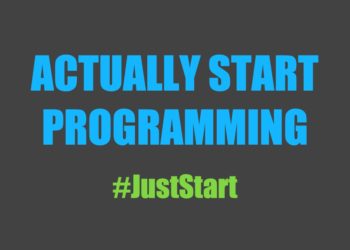
Do you need a university degree to become a programmer? If this is a question you’ve been asking yourself, keep reading.
This question requires more than a simple yes or no answer. It heavily depends on you, your preferences, and your situation, but this post should help you gain some clarity.
Before I get into it though, I want to make something clear. My intention is not to bash post-secondary education by writing this post. Going to university has its benefits. Aside from the education itself, you’ll probably form connections which can help you get a job once you graduate, you’ll make friends and maybe even start a startup.
Anyone can learn to code
While not everyone should become a programmer, anybody can, provided they’re willing to put in the time and effort. You don’t need to go to college or university to learn how to write code. You can get to the point where you’re capable of building 3D multiplayer games, simply by investing time and knowing how to use the internet.
Of course, you need to be self-motivated as well. If you struggle to get work done when you’re on your own schedule, that will pose a problem. In that case, you may want to consider a formal education to help keep you accountable and on task.
So no, you don’t need a degree to become a programmer. You can do so in your free time as long as you put in the effort.
But surely you need a degree to get a programming job…right?
Not exactly. I think many people are under the impression that you need a university degree to be materialistically successful.
Although this is true for most science fields, computer science seems to be the exception. We live in an online age, with unimaginable amounts of information at our fingertips. Not only can you teach yourself, but online alternatives to formal education are becoming available. Certificates like Treehouse’s Techdegree cost only 25$ per month, take between three and twelve months to complete (depending on how much time you invest every day), and are recognized by employers.
According to this survey of well over 30,000 developers, 90.6% of employers look for work experience and 72.7% for a strong portfolio, while only 41.7% of them look for a degree in a potential employee. “What you do matters more than what’s on your resume.”
This other survey from HackerRank of 10,000+ young developers (ages 18-24) shows that over half of them are at least partially self-taught and 27.4% are completely self-taught.
One of the reasons so many programmers are self-taught is that even with a degree, if you stop learning on your own, your knowledge will be outdated pretty soon. The field of computer science is evolving so fast that university programs often lag behind.
So should you get a CS degree?
Pros of going to university and getting a CS degree:
- your learning will be more structured (especially important if you’re not as self-motivated)
- you’ll form connections, which will make getting a job easier
- you’ll meet like-minded people, maybe start a startup
- you’ll have a degree, which might make getting a job easier
Cons of going to university and getting a CS degree:
- it’s very expensive
- you’ll spend four years (in most programs) which you could otherwise spend building your portfolio and gaining work experience
- first year of university is often not as topic specific, meaning you may need to take courses that don’t interest you at all
- on its own, getting a degree is not enough to learn how to code
- CS is evolving so quickly that you’ll have to learn a lot on your own anyways
In the end, it really comes down to your preference and what you think will work best for you. It’s certainly possible to be a successful developer without a degree. The most beneficial thing you’d gain from post-secondary may very well be the connections you form with people working in the industry.
For me personally, I’d prefer to be finished with school. I’m graduating from high school this summer, and if I can, I want to avoid going to university. I’m tired of being stuck at school, feeling like my time is wasting away, so I’ll probably take a year off first.
After that, I’ll reevaluate the situation. If I feel like I’m not getting anywhere on my own, I’ll probably go, but at this point I can’t justify spending that kind of time and money on something that may be unnecessary for me.




